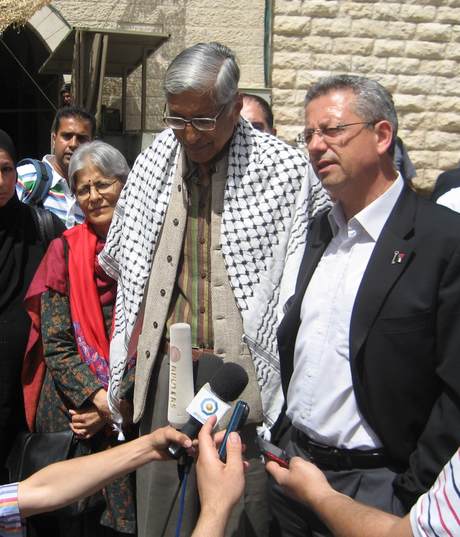Fifty days on the road, through seven countries on three continents, leave a bewildering array of impressions. Dodging volcanic ash, as well as man-made obstructions, we were treated to a rich diet of experiences – and inspired by meeting many heroic individuals.
This ‘Voyage of Dialogue and Discovery’ began in Indonesia, home to the world's largest Muslim population. The genuineness and naturalness of the faith in God of the young Indonesians who invited us was most striking and hope-giving. Here was Islam with heart, with compassion, with warmth.
In South Africa, where the Mahatma first launched his non-violent approach to social justice, the great number of fatherless families and communities made a profound impression.
In Kenya – as indeed in every single country we visited – there was a hunger for reconciliation, often movingly expressed, at other times discreetly suggested, between tribes or races or leaders or within families. A longing for the healing of memory often joined this hunger.
I was not prepared for the impact made by Israeli settlements, walls, and settler-only roads in Palestine. After seeing these immense and innumerable intrusions, it was impossible to believe that enabling an independent Palestinian state to emerge was a serious intention of the Israeli government. The quality, dedication and positive approach of many Palestinians we met were striking.
In Norway I was struck by the work being done by young families to build bridges with the Muslim minority in their country.
There is a remarkable religiosity in Romania, in level one of the highest in Europe. If Romania has several towns like Baia Mare with its spirit, the pride of its people in the town and its history, and the quality of its youth leaders, then the country has a fine future.
The openness in Ukraine was striking – again and again we were asked what we prescribed for Ukraine’s situation. But we were also repeatedly informed of divisions and suspicions in Ukrainian society. The co-existence of openness and suspicion appeared a paradox to me. The national Week of Trust which was joined to our Voyage seemed an inspired thought. As one observer commented, it managed to place trust on Ukraine’s national agenda.
In every country we visited the most basic messages seemed to make the strongest impact – for instance the idea that when I point my finger at my neighbor, there are three more pointing back at me. This was so with a recent president of a European country, with teenagers in South Africa and Kenya, and elsewhere.
That the most important connectivity to obtain today is between each individual and the ‘inner voice’ of conscience was also a thought that seemed to go home. Many repeated it.
An accompanying thought, namely that the lost connection in many countries between rulers and the ruled had to be answered not only by arrangements for simpler access to rulers, but also by both rulers and the ruled listening to their consciences, also found a strong response.
Wherever we went we invited people to consider a ‘coalition of conscience’. The conscience built into the heart of every living person, that inner voice of truth, is not only available but is irreplaceable if individuals and whole communities are to find a greater destiny. Everybody can make obedience to conscience their goal. It can be a common goal that we all share.
The writer, a grandson of Mahatma Gandhi and research professor at the University of Illinois at Urbana-Champaign, is (2010) on tour as President of Initiatives of Change International.
NOTE: Individuals of many cultures, nationalities, religions, and beliefs are actively involved with Initiatives of Change. These commentaries represent the views of the writer and not necessarily those of Initiatives of Change as a whole.
English

